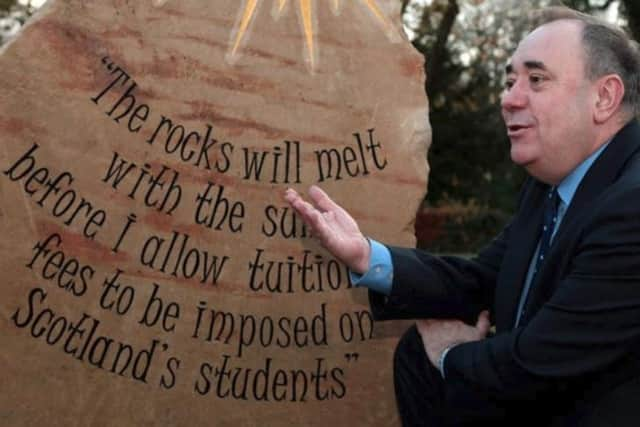Heriot-Watt University takes down tuition fee pledge stone laid by Alex Salmond
and live on Freeview channel 276
Edinburgh’s Heriot-Watt University has announced its decision to remove a stone laid by the then First Minister Alex Salmond, which pledged never to introduce tuition fees on Scottish students.
The words “The rocks will melt with the sun before I allow tuition fees to be imposed on Scottish students” are carved into the monument, which was unveiled by Mr Salmond in 2014.
Advertisement
Hide AdAdvertisement
Hide AdThe former First Minister - who made the comment in March 2011 - unveiled the stone as his last act before going to Holyrood to make his resignation statement.


A spokesperson for Heriot-Watt University said: “Following consultation with the Heriot-Watt University Student Union, a decision has been taken to use the current location of the commemorative stone for an alternative public art work which will appeal to our international student community.
“The stone will be carefully looked after until an alternative location is found for it in future.”
While students south of the border have to pay tuition fees of up to £9,000 a year for their studies, the SNP administration at Holyrood passed legislation to scrap the charges which students in Scotland had to pay on completion of their degrees.
Advertisement
Hide AdAdvertisement
Hide AdMr Salmond has previously called the legislation “the single biggest achievement” of his government.
The move comes as the Scottish government considers ending the “free” places provided to EU students as a way to help universities across Scotland weather the economic turmoil caused by coronavirus.
Universities minister Richard Lochhead called on the UK Government to answer an "SOS" plea from the sector to make good on Boris Johnson's pledge to make the country a "scientific superpower."
It is estimated that universities could lose anywhere between £380-£650 million in 2020/21, Mr Lochhead told Holyrood’s education committee today.
Advertisement
Hide AdAdvertisement
Hide Ad"These are massive challenges facing the sector, not just loss of students but research as well,” he said.
"So it could be three, four, five years to recover from this."
Students from EU nations currently receive free tuition in Scotland because EU rules prevented them being treated differently from Scottish students.
Students from England, Wales and Northern Ireland are charged fees as they are not from another EU state, but regarded as internal UK students.
A message from the Editor
Advertisement
Hide AdAdvertisement
Hide AdThank you for reading this story on our website. While I have your attention, I also have an important request to make of you.
With the coronavirus lockdown having a major impact on many of our advertisers - and consequently the revenue we receive - we are more reliant than ever on you taking out a digital subscription.
Subscribe to scotsman.com and enjoy unlimited access to Scottish news and information online and on our app. With a digital subscription, you can read more than 5 articles, see fewer ads, enjoy faster load times, and get access to exclusive newsletters and content. Visit https://www.scotsman.com/subscriptions now to sign up.
Our journalism costs money and we rely on advertising, print and digital revenues to help to support them. By supporting us, we are able to support you in providing trusted, fact-checked content for this website.
Joy Yates
Editorial Director
Comment Guidelines
National World encourages reader discussion on our stories. User feedback, insights and back-and-forth exchanges add a rich layer of context to reporting. Please review our Community Guidelines before commenting.